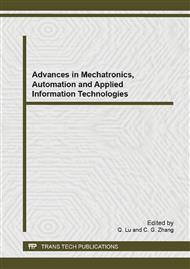p.1185
p.1189
p.1197
p.1201
p.1205
p.1209
p.1213
p.1217
p.1221
Computationally Efficient Extended Kalman Filter for Nonlinear Systems
Abstract:
A computationally efficient extended Kalman filter is developed for nonlinear estimation problems in this paper. The filter is performed in three stages. First, the state predictions are evaluated by the dynamic model of the system. Then, the dynamic equations of the rectification quantities for the predicted states are designed. Finally, the state estimations are updated by the predicted states with the rectification quantities multiplied by a single scale factor. One advantage of the filter is that the computational cost is reduced significantly, because the matrix coefficients of the rectified equations are constant. It doesnt need to evaluate the Jacobian matrixes and the matrix inversion for updating the gain matrix neither. Another advantage is that a single scale factor is introduced to scale the model approximated error, leading to an improved filter performance. The excellent performance of the proposed filter is demonstrated by an example with the application to the estimation problems for the sensorless permanent magnet synchronous motor direct torque control system.
Info:
Periodical:
Pages:
1205-1208
Citation:
Online since:
November 2013
Authors:
Price:
Сopyright:
© 2014 Trans Tech Publications Ltd. All Rights Reserved
Share:
Citation:


